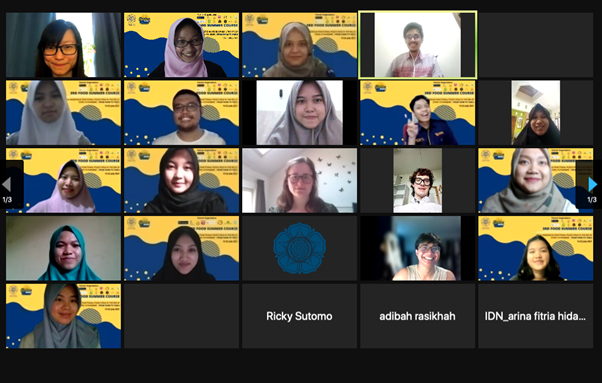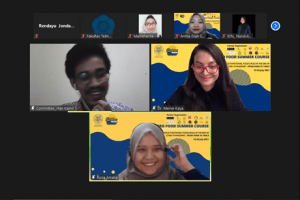
The ninth day the 3rd summer course on food with the theme of Local Indigenous Functional Food’s Roles in The Era of Covid-19 Pandemic: From Farm to Table was about Management and Supply Chain. There were three speakers including Dr. Merve Kaya from Algaenergy, Prof. Kune-muh Tsai from National Kaohsiung of Science and Technology University, and Prof. Christine Yung Hung, Ph.D. from Ghent University. The sessions were led by Rosa Amalia, S.T.P., M.Sc from Faculty of Agricultural Technology, Universitas Gadjah Mada.
 The first session was about “Functional Foods Marketing and Management” which was delivered by Dr. Merve Kaya. The main topic Dr. Merve Kaya discusses is Microalgae. Currently, microalgae are used in agriculture, aquaculture, human nutrition, animal nutrition, and cosmetics. In the future, microalgae might be used for pharmaceuticals, biomaterials, and biofuels. In addition, Microalgae have benefits in many fields such as a plant-based source with eco-friendly extraction, organic base macronutrients, and complete amino acid, and metabolic profiles with free L-amino acids. Other than that the benefits of microalgae were improving crop vigor, creating healthier plants, advancing flowering and seed/fruit development, and increasing the tolerance to abiotic stress. Hence, it is possible to create new agricultural solutions and a sustainable farming environment using microalgae products.
The first session was about “Functional Foods Marketing and Management” which was delivered by Dr. Merve Kaya. The main topic Dr. Merve Kaya discusses is Microalgae. Currently, microalgae are used in agriculture, aquaculture, human nutrition, animal nutrition, and cosmetics. In the future, microalgae might be used for pharmaceuticals, biomaterials, and biofuels. In addition, Microalgae have benefits in many fields such as a plant-based source with eco-friendly extraction, organic base macronutrients, and complete amino acid, and metabolic profiles with free L-amino acids. Other than that the benefits of microalgae were improving crop vigor, creating healthier plants, advancing flowering and seed/fruit development, and increasing the tolerance to abiotic stress. Hence, it is possible to create new agricultural solutions and a sustainable farming environment using microalgae products.
 In addition, the second session was about “Supply Chain Management in Functional Food Industry” by Prof. Kune-muh Tsai. He opened the discussion with the definition of the supply chain. Other than that, Prof. Kune-muh Tsai gave an example where the functional food industry in Taiwan is mainly distributed across the midstream and the downstream. Next, Prof. Kune-muh Tsai also talked about the functional food supply chain, the differentiation between supply chains of functional food in Taiwan and Brazil, the example of the yogurt supply chain in China, supply chain of challenges of functional food due to trade war and pandemic, cold chain practice (best practice), and international supply chain also explained. Moreover, Prof. Kune-muh Tsai also explained how to control the supply chain risk.
In addition, the second session was about “Supply Chain Management in Functional Food Industry” by Prof. Kune-muh Tsai. He opened the discussion with the definition of the supply chain. Other than that, Prof. Kune-muh Tsai gave an example where the functional food industry in Taiwan is mainly distributed across the midstream and the downstream. Next, Prof. Kune-muh Tsai also talked about the functional food supply chain, the differentiation between supply chains of functional food in Taiwan and Brazil, the example of the yogurt supply chain in China, supply chain of challenges of functional food due to trade war and pandemic, cold chain practice (best practice), and international supply chain also explained. Moreover, Prof. Kune-muh Tsai also explained how to control the supply chain risk.
The last session was delivered by Prof. Christine Yung Hung, Ph.D. about “Consumer Behavior Over Functional Food”. The class was started with an explanation about why studying consumer behavior is important and the application of this study. In the next topic, Prof. Christine Hung talked about why we behave the way we do. Prof. Christine Hung also explained other examples of behavior theory, such as choice overload, construal levels, goal visibility, sunk cost effect, and payment depreciation. Then, Prof. Christine Hung also talked about some types of strategies to influence our food behavior. Three case studies were explained about knowledge, acceptance, and preferences of protein, willingness to pay for iodine and selenium, and food choices during the pandemic situation. At the end of the sessions, the participant was assigned to do some tasks to complete their course.
